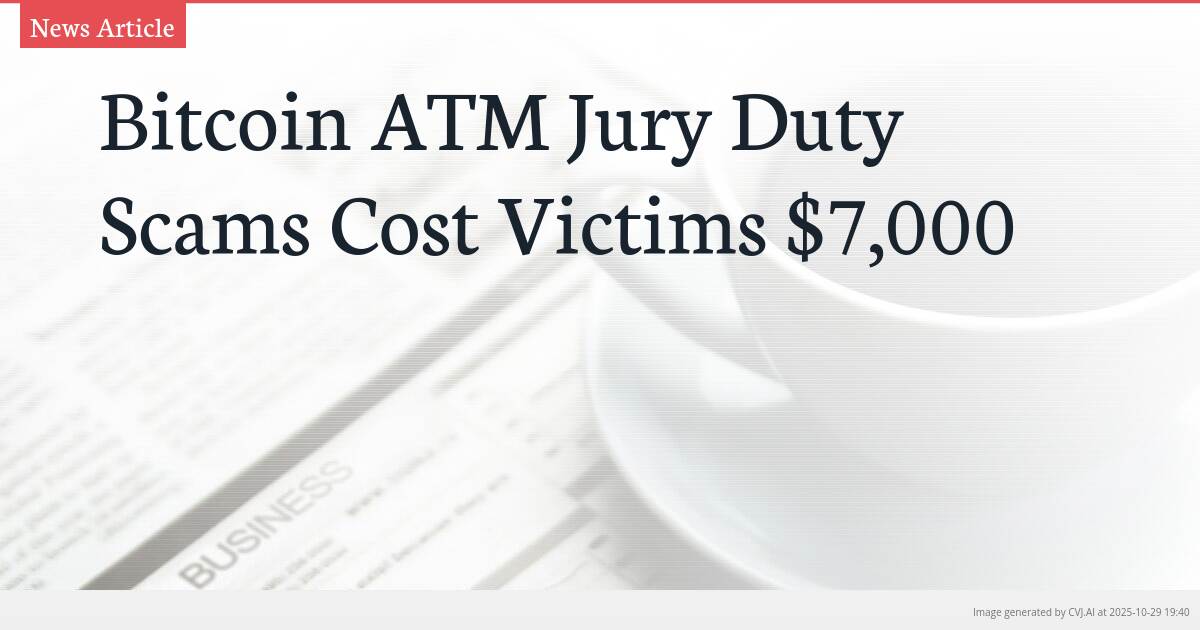This summary text is fully AI-generated and may therefore contain errors or be incomplete.
Introduction
Massachusetts residents lost nearly $7,000 in a sophisticated jury duty scam involving Bitcoin ATMs, highlighting a rapidly growing criminal trend that cost victims nearly $247 million in 2024 according to FBI data. Authorities warn that criminals are increasingly impersonating law enforcement and demanding immediate payments through cryptocurrency kiosks, exploiting the irreversible nature of digital currency transactions to devastating effect.
Key Points
- Scammers impersonated sheriff's office officials, threatening arrest for missed jury duty unless victims paid via Bitcoin ATMs
- FBI data shows Bitcoin ATM scams surged to $247 million in 2024, prompting Treasury Department warnings about elderly targeting
- New regulations are emerging nationwide, including citywide crypto kiosk bans and laws requiring operators to refund scam victims
The Jury Duty Scam: A New Twist on Old Tactics
Two Massachusetts residents fell victim to a carefully orchestrated scheme where callers impersonated officials from the Norfolk County Sheriff’s Office, threatening arrest and detention for allegedly missing jury duty. The victims, caught off guard by the authoritative tone and urgent demands, were instructed to pay nearly $7,000 through nearby Bitcoin ATM kiosks to avoid immediate legal consequences. Sheriff Patrick McDermott confirmed in an official statement that his office never makes such calls, emphasizing that legitimate law enforcement agencies do not threaten arrest or demand payments for missed jury duty or outstanding warrants.
The scam’s effectiveness lies in its psychological manipulation—victims are pressured into immediate action before they can verify the caller’s credentials. As the Norfolk County Sheriff’s Office advised residents, ‘You may be caught off guard and unwittingly fall victim. If they call back. Hang up again and report the calls to your police department.’ This warning underscores the importance of skepticism when receiving unsolicited demands for payment, particularly those involving unconventional payment methods like cryptocurrency.
Bitcoin ATM Fraud: A $247 Million National Crisis
The Massachusetts incidents represent just two cases in a much larger national crisis. According to data from the FBI’s Internet Crime Report, scams involving Bitcoin ATMs and kiosks surged to nearly $247 million in 2024, marking a significant increase from previous years. This dramatic jump prompted the Treasury Department’s Financial Crimes Enforcement Network (FinCEN) to issue an urgent alert in August, specifically flagging the kiosks’ frequent use in scams targeting vulnerable populations, particularly elderly individuals.
The appeal of Bitcoin ATMs for scammers lies in the irreversible nature of cryptocurrency transactions. Once funds are transferred through these kiosks, recovery becomes nearly impossible, as confirmed by the Massachusetts Attorney General’s Office information on crypto scams. A representative for the Norfolk County Sheriff’s Office told media outlets they could not offer guidance on the likelihood of recovery, effectively confirming that victims of these schemes have little recourse once their money has been sent.
Regulatory Response: Bans, Caps, and Victim Protections
Governments at multiple levels are beginning to respond to the growing threat of cryptocurrency kiosk scams. In June, Spokane, Washington’s City Council voted unanimously to ban virtual currency kiosks citywide, representing one of the most aggressive local responses to the problem. Internationally, New Zealand banned crypto ATMs earlier this year and capped international cash transfers to $5,000 as part of broader efforts to deter money laundering and criminal finance.
More nuanced regulatory approaches are also emerging. Illinois recently signed the Digital Asset Kiosk Act into law in August, creating transaction limits for new users and, crucially, requiring ATM operators to refund scam victims in full. This represents a significant shift in responsibility toward kiosk operators and could set a precedent for other states grappling with similar fraud issues. The combination of outright bans and protective regulations indicates a growing recognition that the cryptocurrency kiosk industry requires oversight to prevent further victimization.
📎 Read the original article on decrypt.co

